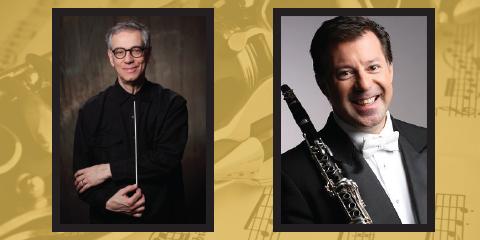A conversation with Academy Director Jim Setapen and Clarinetist Stephen Williamson

February 3rd, 2016
In advance of the Academy Chamber Music concert featuring Chicago Symphony Orchestra clarinetist Stephen Williamson, Saturday, February 6 at 7:30 pm at Nichols Concert Hall, Jim Setapen, Director of the Academy, sat down for a quick conversation with Academy's special guest.
Jim Setapen: Why did you take up the clarinet?
Stephen Williamson: I pursued the clarinet as a diversion not to compete with my older brother on the trumpet. My father was a band director and didn't want me to play the same instrument as my brother since we were only a year or so apart in age. I wanted to play an instrument that was flexible enough to play both classical and jazz mediums, so my father thought that the clarinet was the logical choice. I will forever be indebted to him.
Jim Setapen: Stanley Hasty, my clarinet teacher at the Eastman School of Music, was one of my greatest influences as a musician. Who was the clarinetist who most inspired you and why?
Stephen Williamson: I would say that both Robert Marcellus, Karl Leister and Benny Goodman were my inspirations as clarinet role models. Each of them were monumental in their contributions to the world of clarinet performance. *
Jim Setapen: What have you heard about the Academy at the Music Institute of Chicago?
Stephen Williamson: Many colleagues of mine at the CSO have been affiliated with the Music Institute of Chicago. My two youngest sons, Connor and Matthew are both piano students at MIC.
Jim Setapen: What do you particularly love about the Mozart clarinet quintet?
Stephen Williamson: The Mozart Clarinet Quintet is indelible historically for the composer's love for Anton Stadler**. His creation of this remarkable work and the Concerto only a few months before his death, clearly demonstrates his profound admiration and love for the clarinet's ability to emulate the human voice.
Jim Setapen: What was the best meal you had on the CSO's Asia tour?
Stephen Williamson: If I were to pick the best meal of the CSO's most recent Asian Tour, I would say that in Beijing we were treated to an unbelievable Cantonese meal, filled with so many unique dishes of varying flavors and textures. I will never forget it!
* Robert Marcellus was the principal clarinetist of the Cleveland Orchestra under conductor George Szell. His recording of the Mozart Clarinet Concerto is a classic. Karl Leister was the principal clarinetist of the Berline Philharmonic under Herbert Von Karajan. He also made a beautiful recording of the Mozart. Benny Goodman, besides his work as a jazz clarinetist, commissioned and recorded works for the clarinet by Bartok and Copland, among others.
** Anton Stadler was the greatest clarinetist of the 18th century. Mozart fell in love with his playing and the way he could play the clarinet like a great singer. Mozart composed his great clarinet works for Stadler.
